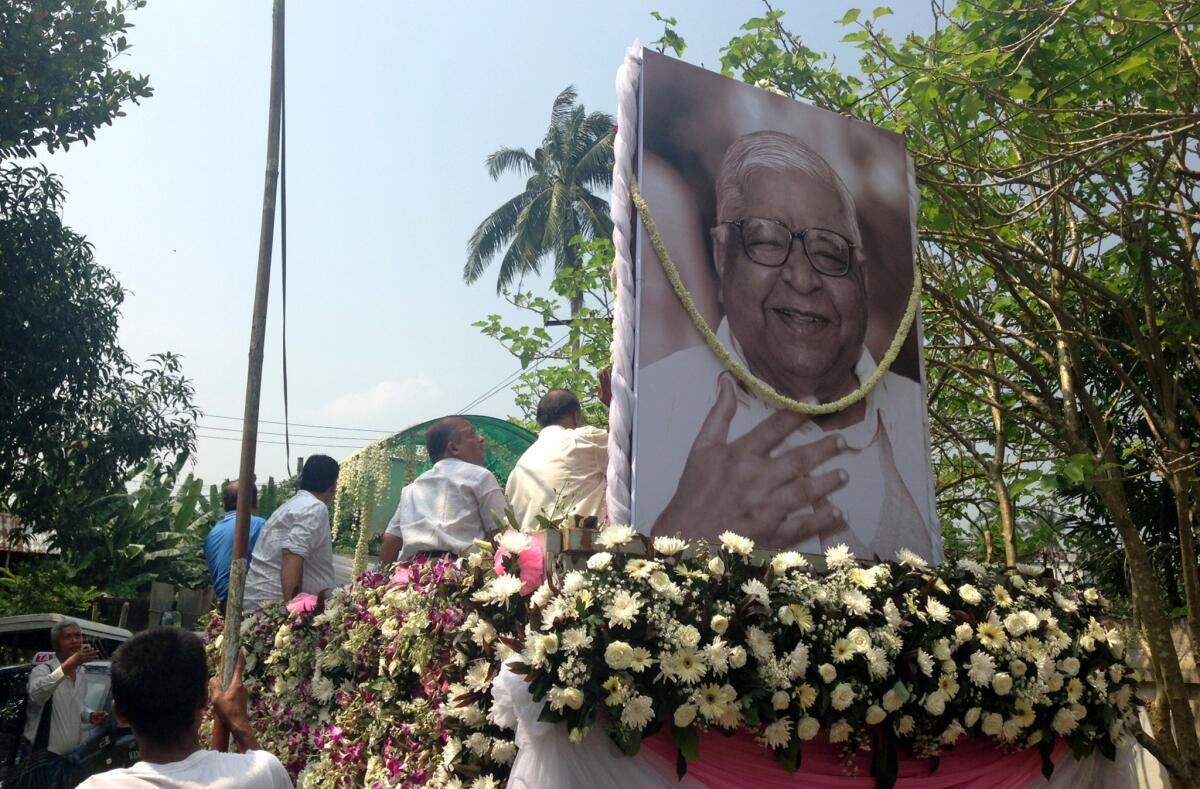Amid traffic and flowers, Myanmar lays guru S.N. Goenka to rest

YANGON, Myanmar -- Downtown Yangon’s famously snarled traffic came to a halt Tuesday morning to let a truck wreathed with pink lilies pass.
It was carrying the ashes of S.N. Goenka, the noted meditation guru who died last week in Mumbai, India, at the age of 90.
Goenka, whose signature 10-day silent retreats drew tens of thousands of people each year, spent much of his life in India. But he was born in Myanmar, and this is where he began his spiritual path. He asked that on his death his remains be brought home and scattered in the Irrawaddy River.
Goenka believed that anyone of any faith could benefit from meditation. He was one of the first to teach people from all religious backgrounds that peace could be attained by tuning in to the subtleties of the body and the mind.
“The Buddha did not teach Buddhism,” he said. “He taught a way of life.”
Born to ethnic Indian parents in Mandalay, Goenka was a successful businessman when he visited a local Vipassana meditation teacher who a friend said might be able to help cure Goenka’s migraines.
The teacher, Sayagyi U Bha Khin, said Goenka should go to a doctor for the headaches but offered lessons on meditation that changed the course of Goenka’s life. He turned to studying meditation full time after the military took over Myanmar and nationalized its industry.
After 13 years as a student, Goenka moved to India to teach. His nonsectarian meditation courses, in which he coached students to pay close attention to the breath, grew in popularity. Among his early students were Joseph Goldstein and Sharon Salzberg, two Americans credited with introducing a similar breath-focused, light-on-ritual breed of Buddhism that has become popular in the West.
During a 2002 road trip across North America in an RV, which brought him to Los Angeles, Goenka was greeted like a rock star.
His method focused on free meditation retreats, supported by donors, at more than 150 centers around the world. Along with hours of daily meditation, the retreats incorporate DVDs of Goenka teaching, including his emphasis on the Buddha’s message that everything in life is impermanent.
Goenka’s ashes will be scattered by his family in three places in Myanmar, including near his birthplace in Mandalay. Yangon was the first stop.
Before Tuesday’s funeral procession, Goenka’s followers gathered at the center he founded on a shady compound near the city’s famous Buddhist landmark, the Shwedagon Pagoda. In a quiet meditation hall, about two dozen people sat cross-legged and eyes closed as people came in to pay their respects at an altar topped with a large bronze urn.
There were students old and new.
Kerstin Adamle, a traveler from Germany, said she finished her first 10-day retreat only last week.
Saw Mya, a Yangon doctor, said she has been following Goenka since the 1970s, when she heard him speak about the potential of meditation to increase concentration. “I thought, ‘That sounds reasonable,’” she said with a laugh. Now a senior teacher at the Yangon center, she also leads an initiative of Goenka’s to bring meditation training to children.
She watched as the urn containing his ashes was carried out and placed in the bed of the flower-adorned truck that also held a large portrait of the guru, showing him pudgy, smiling and with perfectly coiffed white hair.
With much shouting and arm-gesturing, a dozen men helped guide the truck off the property and down a narrow alley. Long poles helped lift low-hanging electrical wires and a tree branch that almost knocked the picture to the ground.
The procession made its way to the waterfront with a police escort. A recording of Goenka chanting in Hindi was broadcast over a loudspeaker. At the jetty, dockworkers and tourists watched as Goenka’s sons walked the urn to a boat and then pushed off into the river.
Nobody cried.
“What for?” said Phyu Wint Yee, a longtime follower of the guru.
“Life is always changing,” she said. “If you’ve followed Goenka’s teaching, you know the art of living is the art of dying.”
ALSO:
U.S. fears radical Islamists could take root in Syria
Russian activist sent to mental institution, echoing Soviet era
Second team of chemical weapons inspectors heading to Syria
Twitter: @katelinthicum
This article was reported with a grant from the International Reporting Project.
More to Read
Sign up for Essential California
The most important California stories and recommendations in your inbox every morning.
You may occasionally receive promotional content from the Los Angeles Times.











